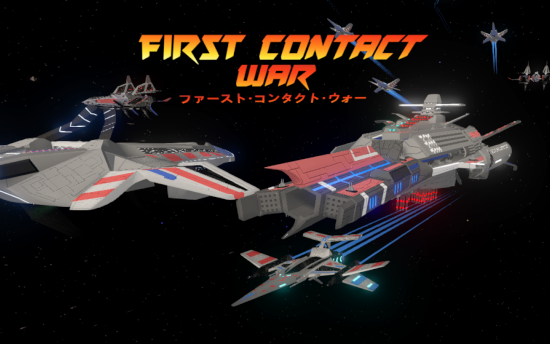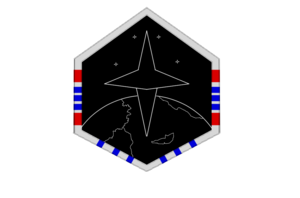Solarians (First Contact War)
| The following information strictly refers to Strygon's First Contact War Universe and is therefore not canon to the FreeSpace Universe, nor is it related. Also, it may contain spoilers regarding First Contact War campaigns. |
|---|
Solarians, (sometimes referred to as Terrans before the First Interstellar Conflict, Humans in a more scientific sense, or informally referred to as "Sollies" by the Gliseans) are carbon-based bipedal lifeforms originating from the Sol System. Notable characteristics are their technology and research focused society, their simpler built bodies and their tendency to infight a lot, yet at the end of the day also come together to destroy a common enemy.
Physiology
In comparison to the more specialized bodies of the Cassydri, the Solarians are quite similar to the Denebim in that their main method of propulsion is simple yet effective bipedalism. Tools and objects are held with hands and opposable thumbs.
Their internally placed organs are protected with multiple layers of various types of organic "armor", ranging from hard bone cages to a thin but stretchy layer of skin. This renders them quite resistant to blunt and cutting weapons, but they are much weaker to energy based weaponry, such as laser rifles or plasma cannons. Lifespans typically range from 90-140 years, but thanks to a little bit of gene editing, these spans can be skirted a bit.
History
Early Space History
Initially known as "Terrans" following the launch of the Three Pioneers back in 2106, using their home planet of Earth as the basis for their name, various nations of Earth spread out to colonize planets all across the Solar System. Over time, these nations merged from earthborne nations into full space nations.
The Solar Splintering
Eventually, the entire Solar System was colonized. Based on Earth was the Greater Earthen Unified Forces (GE-UF), with the Lunar Kingdom as its direct neighbour. A direct ally of Earth was the Martian Republic, and acting indirectly as a stopgap between the inner and outer Sol System was the Rim Federate States, who had set up colonial stations all over the asteroid belt. Beyond that was the Jovian Pact, the Titanian Union and the Outer Rim Collective. All these nations initially cooperated strongly, but over time these alliances would gradually diverge as their interests and ideologies did.
In 2136, border tensions increased as a primiive yet large military force moved from the Jovian Pact territories over to the Martian Republic, without any ahead notice. The Pact claimed it was a "mere scouting party searching for a lost ship" but the Martian Republic did not accept this excuse and responded with its own fleet of warships. The resuling skirmish was ultimately won by the Martians, but the incident was initially covered up.
More such skirmishes would happen until one day, in 2138, a sudden orbital attack wiped out most Martian Ground Colonies and its main HQ, followed by a formal declaration of war from the Jovian Pact to the Martian Republic. What soon followed was a chain reaction of Inner and Outer Solar nations declaring war on eachother, starting the event known as the Solar Splintering.
This war would last for over 7 years and see the rise of modern space combat as it is known today. Despite the primitive technologies, it would go down in history as one of the bloodiest wars ever fought.
In 2145, the war eventually came to an end. The Martian Republic was completely annihilated, the Jovian Pact and Titanian Union were puppeted by the GE-UF and denied any future military fleets, and the first Bluespace Node was discovered, the Proxima Centauri Node. This would kickstart yet another colonial boom, with many nations financing expeditions and colonization efforts outside the Sol System.
The Cassydri
Upon entry into the Proxima Centauri System, the 1st Expeditionary Fleet encountered upon a massive ship of an unknown design. It was waiting in front of the node as if it had expected the arrival of the Solarians, some of the pilots claimed.
The Fleet Admiral suggested hailing the craft, which was expected to fail, yet despite the assumed difference in technology, the warship not only received the signal, but even responded in English (a feat that is still not known how it was achieved, and is the subject of many debates in the scientific communities). The alien crew of the warship seemed very cooperative and friendly, much to the surprise of the fleet. After a short exchange, the warship requested permission to land a diplomacy vessel in the fleet carrier's hangar bay. Despite some initial reluctance, permission was granted and a transport ship shortly found its way into the carrier.
Still expecting it to be a ruse, the hangar was put on guard. However, instead the transport craft opened with what is assumed to be an individual alien entity along with various strange devices. The alien did not speak any comprehensible language but the devices it left behind before departing from the carrier again, were labelled in clear english as well. Shortly before departing, the alien vessel introduced itself as "The Cassydri Trade Guild welcoming you to the Interstellar Community". Henceforth these strange alien creatures were known as the Cassydri.
The devices, known historically as "The Cassydri's Gifts" turned out to be a Bluespace Comms Beacon, which could send near-instant comms signals between star systems, and a shield emitter. Both devices were reverse engineered and mass produced, which formed yet another strong technological base for modern space vessels.
Extrasolar Colonization
Eventually, as more and more systems got discovered, and more colonies were set up, nations were reformed once more. The Sol system shifted governance into a singular nation, the Coreworld Union, which would soon govern the surrounding systems of Sirius, Proxima Centauri and Vega.
The Helios System, discovered in 2251, was found to harbor an abundance of various rare and useful gases, some of which are critical for the fusion reactors every ship employs these days. As more mining and refinery stations formed within and around the Helios System, a full scale community was formed around them, becoming the Helios Miner's Community.
The Kepler and Gliese systems were often very good colonization candidates, containing many of the most Earthlike planets to this date. Formerly a colony of the Coreworld Union, they eventually formally demanded independence, which was, surprisingly enough, accepted unconditionally. This collective was from then on known as the Kepler-Gliese Community.
Over 50 systems were colonized over time, resulting in a repeat of the American Colonization boom in Earth's history, but on a much larger scale.
The Denebim
In 2265, during an expedition and survey mission in the Deneb System, the 7th Expeditionary Group encountered something unexpected. Yet another ship of completely unknown design and origin. Curious, a scouting party was deployed to tail this unknown ship, which lead them to Deneb III (nowadays known as Siverya by the Denebim and Solarians). Unlike with the Cassydri, the Denebim did not understand any Earth languages, so attempted hailings were initially dismissed as mere comms noise, but eventually the ship was made aware of the presence of the Solarian scouts. So it disabled the scouts and carried the pilots to the planet surface.
On the surface, the scout pilots were greatly surprised to find that these aliens looked extremely similar to humans, except with the core difference of these aliens having rabbit ears. One pilot initially thought they were under the effects of mind affecting drugs due to the surreality of the situation.
The pilots were brought to a grand palace, where the Denebim Queen resided. However, the initial problem after the pilots were brought in front of her was that neither party knew how to communicate with one another, resulting in, as another pilot described, "the world's most awkward meeting with royalty in history." Luckily, with a lot of time, failed attempts and exasperated gesturing, very rudimentary communication could be established, and the pilots were returned to the fleet, along with a diplomatic party of Denebim Linguists that were meant to finally establish more reliable communication with their new neighbours and potential allies.
Once proper communication was established with the Coreworld Union, the two nations traded star charts, technologies and various other items in a cultural and technological exchange event. The two races thusly started forming a strong alliance.
The Glisean Pact and the USDF
Dissatisfaction with sparse resources and the fact that they were much further behind in terms of ship technologies, along with the rise of a group known only as "The Elder Nationalists" (a callback to a group with the same name that had similar ideals almost 200 years ago), the Kepler-Gliese Community formed a rift between the Kepler and Gliese parts. The Gliese colonies grew resentful of the pacifistic views of the Kepler Colonies and eventually, in 2282, split off from the Kepler part, with the Elder Nationalists forming a ruling council over the Gliese colonies. The population also renamed themselves to "Gliseans", to signify the lone path they chose to follow.
This sudden event took every other nation by surprise, causing growing concerns over a weak unity between the nations. As a response to these concerns, the other nations formed a collective military alliance, known as the United Solarian Defense Federation. The purpose of the USDF is to act as a common cause for each nation to pool military resources into, and to unify the Solarian nations and fortify them against any possible threats looking to destroy them.
Technology
Solarian technology is widely varied, but often tends to stick to its basics for a long time. Being far more experienced with kinetic weaponry and steel metallurgy than pure energy weaponry, their kinetic-based weapons tend to peform better and most of their ships use Durasteel as a primary component for shipwrighting. Handheld weapons are often also still standard powder rifles and coilguns.
Before the invention of modern space flight, all ships still used orbital mechanics to fight eachother, resulting in very long battles that primarily consist of waiting for a rendezvous with the enemy. This changed when Aiko Matoke, a North Japanese Military Engineer who developed the theory of "Relative Point Flight Anchoring" that relies on a fleet's navigation systems to calibrate towards a single point in orbit, which would mean all ships would be on the same path and appear stationary to eachother.
Upon adoption of this theory, naval battles became much more like the traditional wet navy battles of history, with fighters gaining importance in dogfights, bombing and interception again.
After the encounter with the Cassydri, every ship from then on was equipped with an energy shield generator and Bluespace Comms Arrays. This allows for near instant communication betwen fleets even across the other side of Solarian Territory.
Throughout the Solar Splintering, the first ship-based energy weapons were developed and mass produced, and capital ships were equipped with large beam weaponry. Initially inefficient, short ranhged and weak, these beam cannons grew better and stronger over time.

